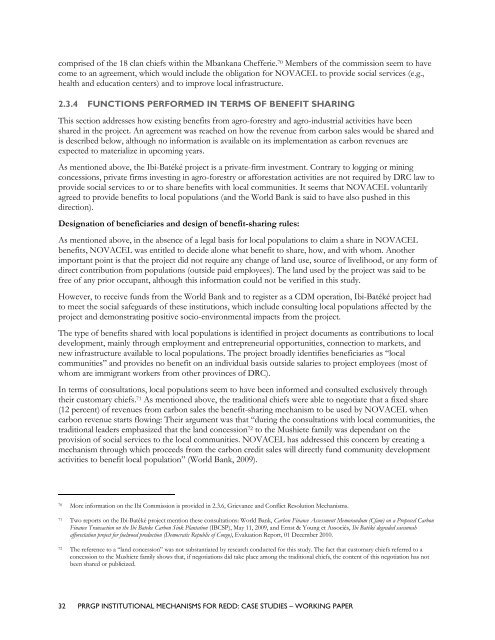Institutional Mechanisms for REDD+ - Case Studies Working Paper
Institutional Mechanisms for REDD+ - Case Studies Working Paper
Institutional Mechanisms for REDD+ - Case Studies Working Paper
Create successful ePaper yourself
Turn your PDF publications into a flip-book with our unique Google optimized e-Paper software.
comprised of the 18 clan chiefs within the Mbankana Chefferie. 70 Members of the commission seem to have<br />
come to an agreement, which would include the obligation <strong>for</strong> NOVACEL to provide social services (e.g.,<br />
health and education centers) and to improve local infrastructure.<br />
2.3.4 FUNCTIONS PERFORMED IN TERMS OF BENEFIT SHARING<br />
This section addresses how existing benefits from agro-<strong>for</strong>estry and agro-industrial activities have been<br />
shared in the project. An agreement was reached on how the revenue from carbon sales would be shared and<br />
is described below, although no in<strong>for</strong>mation is available on its implementation as carbon revenues are<br />
expected to materialize in upcoming years.<br />
As mentioned above, the Ibi-Batéké project is a private-firm investment. Contrary to logging or mining<br />
concessions, private firms investing in agro-<strong>for</strong>estry or af<strong>for</strong>estation activities are not required by DRC law to<br />
provide social services to or to share benefits with local communities. It seems that NOVACEL voluntarily<br />
agreed to provide benefits to local populations (and the World Bank is said to have also pushed in this<br />
direction).<br />
Designation of beneficiaries and design of benefit-sharing rules:<br />
As mentioned above, in the absence of a legal basis <strong>for</strong> local populations to claim a share in NOVACEL<br />
benefits, NOVACEL was entitled to decide alone what benefit to share, how, and with whom. Another<br />
important point is that the project did not require any change of land use, source of livelihood, or any <strong>for</strong>m of<br />
direct contribution from populations (outside paid employees). The land used by the project was said to be<br />
free of any prior occupant, although this in<strong>for</strong>mation could not be verified in this study.<br />
However, to receive funds from the World Bank and to register as a CDM operation, Ibi-Batéké project had<br />
to meet the social safeguards of these institutions, which include consulting local populations affected by the<br />
project and demonstrating positive socio-environmental impacts from the project.<br />
The type of benefits shared with local populations is identified in project documents as contributions to local<br />
development, mainly through employment and entrepreneurial opportunities, connection to markets, and<br />
new infrastructure available to local populations. The project broadly identifies beneficiaries as ―local<br />
communities‖ and provides no benefit on an individual basis outside salaries to project employees (most of<br />
whom are immigrant workers from other provinces of DRC).<br />
In terms of consultations, local populations seem to have been in<strong>for</strong>med and consulted exclusively through<br />
their customary chiefs. 71 As mentioned above, the traditional chiefs were able to negotiate that a fixed share<br />
(12 percent) of revenues from carbon sales the benefit-sharing mechanism to be used by NOVACEL when<br />
carbon revenue starts flowing: Their argument was that ―during the consultations with local communities, the<br />
traditional leaders emphasized that the land concession 72 to the Mushiete family was dependant on the<br />
provision of social services to the local communities. NOVACEL has addressed this concern by creating a<br />
mechanism through which proceeds from the carbon credit sales will directly fund community development<br />
activities to benefit local population‖ (World Bank, 2009).<br />
70 More in<strong>for</strong>mation on the Ibi Commission is provided in 2.3.6, Grievance and Conflict Resolution <strong>Mechanisms</strong>.<br />
71 Two reports on the Ibi-Batéké project mention these consultations: World Bank, Carbon Finance Assessment Memorandum (Cfam) on a Proposed Carbon<br />
Finance Transaction on the Ibi Bateke Carbon Sink Plantation (IBCSP), May 11, 2009, and Ernst & Young et Associés, Ibi Batéké degraded savannah<br />
af<strong>for</strong>estation project <strong>for</strong> fuelwood production (Democratic Republic of Congo), Evaluation Report, 01 December 2010.<br />
72 The reference to a ―land concession‖ was not substantiated by research conducted <strong>for</strong> this study. The fact that customary chiefs referred to a<br />
concession to the Mushiete family shows that, if negotiations did take place among the traditional chiefs, the content of this negotiation has not<br />
been shared or publicized.<br />
32 PRRGP INSTITUTIONAL MECHANISMS FOR REDD: CASE STUDIES – WORKING PAPER

















